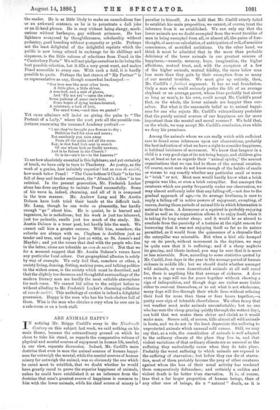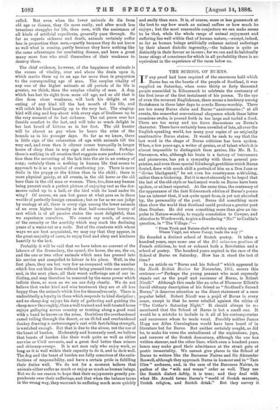ARE ANIMALS HAPPY?
IN noticing Mr. Briggs Carlill's essay in the Nineteenth Century on this subject last week, we said nothing on his
peculiar to himself. As we hold that Mr. Carlill utterly failed to establish his main proposition, we cannot, of course, treat the inference from it as established. We can only say that the lower animals are no doubt exempted from the worst troubles of man in being exempted from all, or almost all, the pains of fore- thought, of anxious calculation, of anticipation of evil, of sensitive consciences, of mortified ambitions. On the other hand, we think it must be admitted that in the more than probable deficiency of the lower animals in our greatest sources of happiness,—namely, memory, hope, imagination, the higher affections, mutual trust, and, with the exception of a few of the higher animals, mutual fidelity, the races below man lose more than they gain by their exemption from so many of our mental troubles. We must give up entirely, then, Mr. Carlill's is fortiori argument. It has no real foundation. Only a man who could seriously prefer the life of an average elephant or an average parrot, whose lives probably last about as long as man's, to his own, could accept Mr. Carlill's proof that, on the whole, the lower animals are happier than our- selves. But what is the reasonable belief as to animal happi- ness for one who rejects Mr. Carlill's extraordinary postulate that the purely animal sources of our happiness are far more important than the mental and moral sources P We hold that, on the whole, we may accept Mr. Carlill's conclusion, even while we deny his premisses.
Among the animals whom we can really watch with sufficient ease to found some inferences upon our observations, probably the best indication of what we have a right to consider happiness, is habitual briskness of movement. We know that languor in a child is a very good sign of its not being happy, and children give us, at least so far as regards their "animal spirits," the nearest organisations that we can find to those of the animal creation. Of course, most men do not know enough of the habits of snails or worms to say exactly whether any particular snail or worm is " brisk " or not. Most men would hardly know what a brisk penguin was like, or even a brisk caterpillar. But amongst the creatures which are pretty frequently under our observation, we may almost uniformly infer that any falling-off,—not due to the gradual approach of age,—in its average liveliness, is sure to imply a falling-off in active powers of enjoyment, excepting, of course, during those periods of animal life in which hibernation is natural to them. A dormouse or a squirrel is probably enjoying itself as well as its organisation allows it to enjoy itself, when it is taking its long winter sleep ; and it would be as absurd to conclude from the passivity of a tortoise at the right season for burrowing that it was not enjoying itself so far as its nature permitted, as it would from the quiescence of a chrysalis that the caterpillar was miserable. But when a bird sits humped up on its perch, without movement in the daytime, we may be quite sure that it is suffering; and if a sheep neglects its grazing, and bleats instead, you may be sure that it is more or less miserable. Now, according to some statistics quoted by Mr. Carlill, font- days in the year is the average period of human sickness in middle life ; but we should doubt whether amongst wild animals, or even domesticated animals at all well cared for, there is anything like that average of sickness. A dove even in a cage will coo for years together without showing a sign of indisposition, and though dogs are rather more liable either to over-eat themselves, or to eat what is not wholesome, many dogs will live through their whole lives without refusing their food for more than three or four hours together,---a pretty sure sign of tolerable cheerfulness. We often fancy that wet weather must make animals uncomfortable ; but no one who has seen the sheep grazing quietly through the wettest days, can hold that wet makes them shiver and shrink as it would make man. Severe cold, of course, kills almost all wild animals in hosts, and we do not in the least depreciate the suffering to unprotected animals which unusual cold causes. Still, we may say that, as a rule, the constitution of animals is well adapted to the ordinary climate of the place they live in, and that violent variations of that ordinary climate are as unusual as the suffering they undoubtedly cause when they do take place. Probably the worst suffering to which animals are exposed is the suffering of starvation ; but before they can die of starva- tion, most of them probably become the prey of other creatures against whom the loss of their usual activity has rendered them comparatively defenceless; and certainly a sudden and violent death is far better than starvation. It is, of course, true that a far larger proportion of human beings, than of any other race of beings, die a " natural " deatb, as it is
called. But even when the lower animals do die from old age or. disease, they die more easily, and after much less tenacious struggles for life, than men, with the assistance of all kinds of artificial expedients, generally pass through. So far as regards sickness and death, animals certainly suffer less in proportion than men,—partly because they do not know so well what is coming, partly because they have nothing like the same advantages for combating disease, and have a great many more foes who avail themselves of their weakness to destroy them.
The chief evidence, however, of .the happiness of animals is the excess of vitality, over and above the drain upon it, which marks them up to an age far more than in proportion to the corresponding age of man. The surplus vitality of any one of the higher animals at all periods of its life is greater, we think, than the surplus vitality of man. A dog, which has lost its sight from mere old age, and so old that it dies from sheer weakness, will bark his delight at an outing of any kind till the last month of his life, and will relish his food heartily up to the very last. The singing- bird will sing and hop about with every sign of liveliness up to the very moment of its last sickness. The cat purrs over her fireside comfort to the last, and will take as much delight in her last brood of kittens as in her first. The old hunter will be almost as gay when he hears the cries of the hounds as in his younger days. So far as we know, there is little sign of the exhaustion of age with animals till the very end, and even then it oftener comes tranquilly in longer hours of sleep than in any sign of active distress. Perhaps there is nothing in all creation that suggests more perfect exalta- tion than the mounting of the lark into the air in an ecstacy of song; certainly there is nothing in human life that seems to approach to it as a symbol of overflowing joy. There is more frolic in the puppy or the kitten than in the child ; there is more physical gaiety, at all events, in the old horse or the old hare than in the old man or woman. Then, too, does any human being present such a perfect picture of enjoying rest as the dor- mouse coiled up in a ball, or the bird with its head under its wing ? Of course, we can but guess at what goes on in these worlds of perfectly foreign sensation ; but so far as we can judge by analogy at all, there is every sign among the lower animals of an even higher intensity in that half-conscious luxury of rest which is of all passive states the most delightful, than we experience ourselves. We cannot say much, of course, of the serenity or the acerbity which may mark the declining years of a water-rat or a mole. But of the creatures with whose ways we are best acquainted, we may say that they appear, in the great majority of cases, to enjoy food and sleep and kindness heartily to the last.
Probably it will be said that we have taken no account of the labours of the dromedary, the camel, the horse, the ass, the ox, and the one or two other animals which man has pressed into his service and compelled to labour in his place. Well, in the first place, they are but very few as compared with the number . which live out their lives without being pressed into our service ; and, in the next place, all their worst sufferings are of our in- flicting, and may therefore be removed by the same power which inflicts them, so soon as we see our duty clearly. We do not believe that under kind and wise treatment they are at all less happy than the animals which live for themselves only. There is undoubtedly a loyalty in them which responds to kind discipline ; and no sheep-dog enjoys his duty of gathering and guiding the sheep more thoroughly, than a well-trained and well-treated horse enjoys galloping across country or trotting along a good road with a band he knows on the reins. Doubtless the overburdened camel toiling through the desert, or an ill-fed and overburdened donkey drawing a costermonger's cart with fast-failing strength, is wretched enough. But that is due to the abuse, not the use of the beast of burden. Moderately and humanely used, we believe that beasts of burden like their work quite as well as either navvies or Civil servants, and a great deal better than miners and chimney-sweeps. It is not men only who enjoy work, so long as it is well within their capacity to do it, and to do it well. The dog and the beast of burden are fully conscious of the satis- factions of responsibility, and have a certain pride in fulfilling their duties well. We do not for a moment believe that animals either suffer as much or enjoy as much as human beings. But we do see reason to hope that their enjoyments greatly pre- ponderate over their sufferings, and that when the balance turns in the wrong way, they succumb to suffering much more quickly
and easily than man. It is, of course, more or less guesswork at the best to say how much an animal suffers or how much he enjoys ; but the most reasonable conjecture we can make seems to be that, while the whole range of animal enjoyment and suffering lies well within that of human nature,—except, indeed, so far as human beings artificially enhance animal sufferings by their almost diabolic ingenuity,—the balance is quite as distinctly in their favour as in ours ; for we can and do habitually incur stings of conscience for which in all probability there is no equivalent in the experience of the races below us.



































 Previous page
Previous page